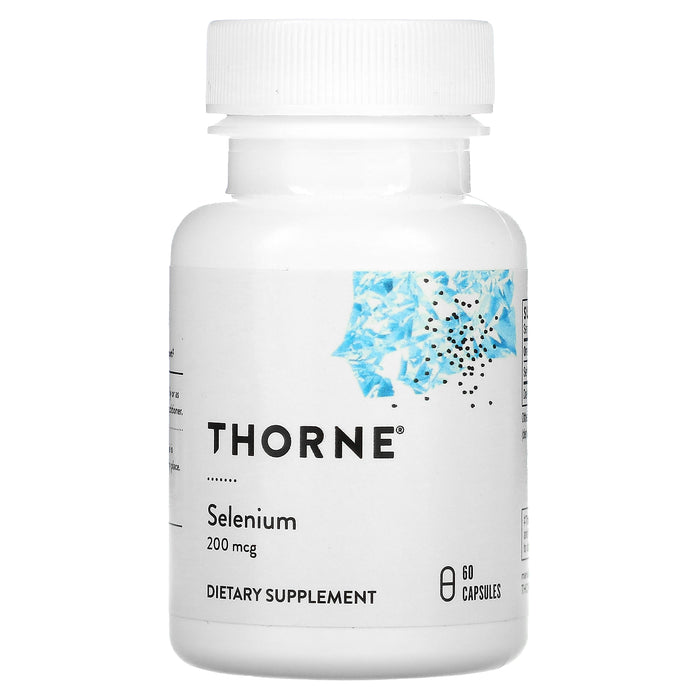




| Serving Size: 1 Capsule | ||
| Servings Per Container: 60 | ||
| One Capsule Contains |
% Daily Value | |
| Selenium (as L-Selenomethionine) |
200 mcg | 364% |
Boost your antioxidant defense with Thorne Research Selenium, a trace mineral supplement.
Selenium is a well-absorbed form of the essential trace mineral that supports healthy heart, cell development, and thyroid function. As an antioxidant mineral cofactor, selenomethionine plays a crucial role in the body's natural antioxidant systems, such as SOD and glutathione, and may help protect against toxic heavy metals.
Take 1 capsule daily or as recommended by your health-care practitioner.
Microcrystalline cellulose, hypromellose (derived from cellulose) capsule.
Tamper Evident: Use only if bottle is sealed. Store tightly sealed in a cool, dry place.
If pregnant, consult your health-care practitioner before using this product.
At Health Orchard, we are committed to providing accurate product information and images. However, manufacturers may update their product packaging or ingredients, and these changes may not be immediately reflected on our website. It's possible for products to be shipped with different packaging than what is shown online. For the most accurate and safe use of any product, we advise reading the product's label, warnings, and instructions rather than relying solely on the details provided by Health Orchard.
Thorne Research Selenium offers several potential health benefits due to selenium's crucial role in various bodily functions. Selenium is an essential trace mineral that acts as a powerful antioxidant, helping to protect cells from oxidative damage. It plays a vital role in thyroid function, supporting the production and regulation of thyroid hormones.
Taking Thorne Research Selenium daily is generally considered safe when used as directed and within the recommended dosage. Selenium is an essential mineral that our bodies need in small amounts for optimal function. However, it's important not to exceed the recommended daily intake, as selenium can be toxic in high doses.
While selenium supplementation is beneficial for many, certain individuals should exercise caution or avoid Thorne Research Selenium. People with existing high selenium levels or those living in areas with selenium-rich soil should be cautious about additional supplementation. Individuals with certain thyroid conditions, particularly autoimmune thyroid diseases, should consult a healthcare provider before taking selenium supplements.
While side effects from Thorne Research Selenium are generally rare when taken as directed, some individuals may experience adverse reactions. Potential side effects can include nausea, diarrhea, or a metallic taste in the mouth. In rare cases, excessive selenium intake can lead to more serious symptoms such as hair loss, nail brittleness, or neurological issues.
Thorne Research Selenium, when taken as directed, is not typically associated with negative effects on kidney health. In fact, some research suggests that adequate selenium levels may be beneficial for kidney function. However, excessive selenium intake over prolonged periods could potentially stress the kidneys, as they play a role in selenium metabolism and excretion.
Thorne Research Selenium, when used as directed, is not known to cause liver damage. Selenium is actually important for liver function and may even have protective effects on liver health. However, extremely high doses of selenium, far exceeding the recommended intake, could potentially lead to liver problems.